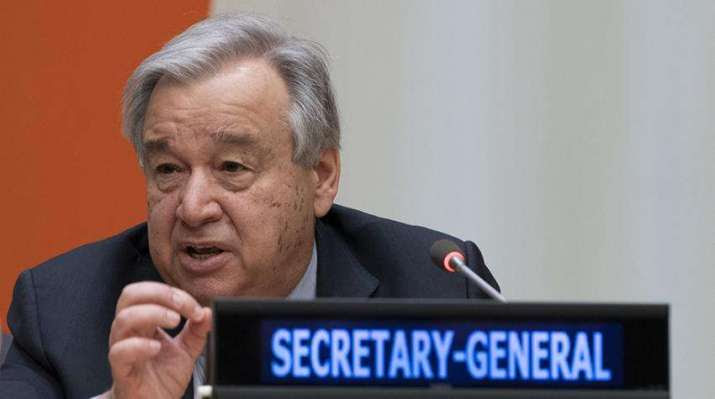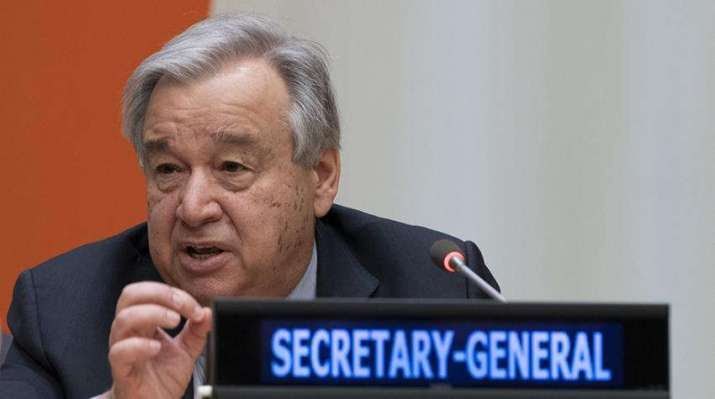 Secretary-General António Guterres. From un.org
Secretary-General António Guterres. From un.orgThe WHO defines the word pandemic loosely – “the worldwide spread of a new disease”.
According to the US Centers for Disease Control and Prevention (CDC), a pandemic is a disease that has spread in multiple countries around the world, usually affecting a large number of people.
The word comes from the Greek word “pan” meaning all and “demos” meaning people.
Tedros Adhanom Ghebreyesus, WHO Director-General, said he was “deeply concerned” by the “alarming levels of inaction” as the outbreak shows no signs of slowing down.
“In the past two weeks, the number of cases of COVID-19 outside China has increased 13-fold, and the number of affected countries has tripled,” Tedros said.
According to the WHO, more than 90 percent of cases are in just four countries – China, Italy, Iran and South Korea. However, the number of cases in China and South Korea is declining significantly, according to the WHO.
Many countries continue to face an uphill battle when it comes to combating the spread.
“Some countries are struggling with a lack of capacity. Some countries are struggling with a lack of resources,” Tedros added.
About 70 nations are now reported to have given formal backing to an urgent call by the UN secretary-general for a ceasefire on all armed conflicts as the world struggles to battle the growing coronavirus pandemic that has wrought havoc on billions of lives, destroyed livelihoods, and stalled national economies.
“Ten days ago, I issued an appeal for an immediate ceasefire in all corners of the globe to reinforce diplomatic action, help create conditions for the delivery of lifesaving aid, and bring hope to places that are among the most vulnerable to the COVID-19 pandemic,” said United Nations Secretary-General António Guterres in a statement published on 2 March.
“The call has been endorsed by an ever-growing number of Member States, some 70 so far, regional partners, non-state actors, civil society networks and organizations, and all UN Messengers of Peace,” Guterres stated. “Religious leaders—including Pope Francis—have added their moral voice in support of a global ceasefire, as have citizens through grassroots mobilization online.” (United Nations)
Guterres identified several nations that had not appeared on the previous list of 53 nations published on 30 March—including several that are currently engaged in armed conflicts—among them: Cameroon, the Central African Republic, Colombia, Libya, Myanmar, the Philippines, South Sudan, Sudan, Syria, Ukraine and Yemen. The UN has not yet released an updated list of supporting nations.
In a separate statement on Friday, Guterres, the ninth UN secretary-general, who took office in January 2017, acknowledged: “There is a huge distance between declarations and deeds—between translating words into peace on the ground and in the lives of people. There are enormous difficulties to implementation as conflicts have festered for years and distrust is deep, with many spoilers and many suspicions. We know that any initial gains are fragile and easily reversible. And in many of the most critical situations, we have seen no let-up in fighting, and some conflicts have even intensified. We need robust diplomatic efforts to meet these challenges. To silence the guns, we must raise the voices for peace.” (United Nations)
Notably absent from the list to date are four of the five permanent members of the United Nations Security Council: China, Russia, the United Kingdom, and the United States. France has already been formally included on the list. Russia does not yet appear, although it has issued an independent statement voicing support for a global ceasefire. Israel and the UN Observer State of Palestine are both absent.
“The COVID-19 storm is now coming to all these theaters of conflict. The virus has shown how swiftly it can move across borders, devastate countries, and upend lives. The worst is yet to come,” Guterres emphasized. “We need to do everything possible to find the peace and unity our world so desperately needs to battle COVID-19. We must mobilize every ounce of energy to defeat it.” (United Nations)
In unison with his repeated appeals for global peace, Guterres has also called for “ceasefire” measures to address a “horrifying global surge in domestic violence” toward women and girls. The UN News reported on Sunday that restrictions on movement resulting from lockdowns imposed by governments around the world in response to the pandemic “have dramatically increased the numbers of women and girls facing abuse, in almost all countries. However, even before the global spread of the new coronavirus, statistics showed that a third of women around the world experienced some form of violence in their lives.” (UN News)

From consortiumnews.com
At the time of writing on 6 April, global SARS-CoV-2 coronavirus infections were reported to total 1,277,962, with 69,555 deaths so far confirmed, and 264,439 recovered.* The World Health Organization has previously estimated the mortality rate from the virus at 3.4 per cent, based on preliminary data, with the elderly and people with underlying health conditions considered most at risk.
An online petition in support of the global ceasefire initiative, hosted by the US-based nonprofit organization Avaaz, had at the time of writing gathered almost 1.8 million signatures.
“There should be only one fight in our world today,” Guterres said on Friday. “Our shared battle against COVID-19.” (United Nations)
Declaration of a pandemic often leads to governments spending more on preventive measures and funding for vaccination programmes.
That was the case the last time WHO declared a pandemic in 2009 during H1N1 “swine flu” outbreak.












